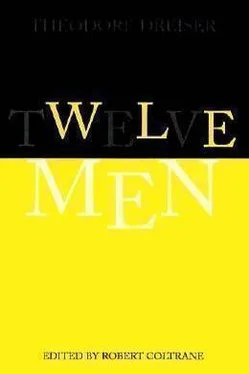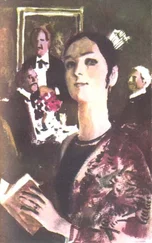Теодор Драйзер - Twelve Men
Здесь есть возможность читать онлайн «Теодор Драйзер - Twelve Men» весь текст электронной книги совершенно бесплатно (целиком полную версию без сокращений). В некоторых случаях можно слушать аудио, скачать через торрент в формате fb2 и присутствует краткое содержание. Год выпуска: 2014, Издательство: epubBooks Classics, Жанр: Биографии и Мемуары, на английском языке. Описание произведения, (предисловие) а так же отзывы посетителей доступны на портале библиотеки ЛибКат.
- Название:Twelve Men
- Автор:
- Издательство:epubBooks Classics
- Жанр:
- Год:2014
- ISBN:нет данных
- Рейтинг книги:4 / 5. Голосов: 1
-
Избранное:Добавить в избранное
- Отзывы:
-
Ваша оценка:
- 80
- 1
- 2
- 3
- 4
- 5
Twelve Men: краткое содержание, описание и аннотация
Предлагаем к чтению аннотацию, описание, краткое содержание или предисловие (зависит от того, что написал сам автор книги «Twelve Men»). Если вы не нашли необходимую информацию о книге — напишите в комментариях, мы постараемся отыскать её.
Twelve Men — читать онлайн бесплатно полную книгу (весь текст) целиком
Ниже представлен текст книги, разбитый по страницам. Система сохранения места последней прочитанной страницы, позволяет с удобством читать онлайн бесплатно книгу «Twelve Men», без необходимости каждый раз заново искать на чём Вы остановились. Поставьте закладку, и сможете в любой момент перейти на страницу, на которой закончили чтение.
Интервал:
Закладка:
One of the sweetest and most interesting of all his mental phases was, as I have reason to know, his attitude toward the problem of suffering and death, an attitude so full of the human qualities of wonder, sympathy, tenderness, and trust, that he could scarcely view them without exhibiting the emotion he felt. He was a constant student of the phenomena of dissolution, and in one instance calmly declared it as his belief that when a man was dead he was dead and that was the end of him, consciously. At other times he modified his view to one of an almost prayerful hope, and in reading Emily Brontë's somewhat morbid story of "Wuthering Heights," his copy of which I long had in my possession, I noted that he had annotated numerous passages relative to death and a future life with interesting comments of his own. To one of these passages, which reads:
"I don't know if it be a peculiarity with me, but I am seldom otherwise than happy while watching in the chamber of death, provided no frenzied or despairing mourner shares the duty with me. I see a repose that neither earth nor hell can break, and I feel an assurance of the endless and shadowless hereafter—the eternity they have entered—where life is boundless in its duration, and love in its sympathy, and joy in its fullness,"
he had added on the margin:
"How often I have felt this very emotion. How natural I know it to be. And what a consolation in the thought!"
Writing a final prescription for a young clergyman who was dying, and for whom he had been most tenderly solicitous, he added to the list of drugs he had written in Latin, the lines:
"In life's closing hour, when the trembling soul flies
And death stills the heart's last emotion,
Oh, then may the angel of mercy arise
Like a star on eternity's ocean!"
When he himself was upon his death–bed he greeted his old friend Colonel Dyer—he of the absent overcoat and over–shoes—with:
"Dyer, I'm almost gone. I am in the shadow of death. I am standing upon the very brink. I cannot see clearly, I cannot speak coherently, the film of death obstructs my sight. I know what this means. It is the end, but all is well with me. I have no fear. I have said and done things that would have been better left unsaid and undone, but I have never willfully wronged a man in my life. I have no concern for myself. I am concerned only for those I leave behind. I never saved money, and I die as poor as when I was born. We do not know what there is in the future now shut out from our view by a very thin veil. It seems to me there is a hand somewhere that will lead us safely across, but I cannot tell. No one can tell."
This interesting speech, made scarcely a day before he closed his eyes in death, was typical of his whole generous, trustful, philosophical point of view.
"If there be green fields and placid waters beyond the river that he so calmly crossed," so ran an editorial in the local county paper edited by one of his most ardent admirers, "reserved for those who believe in and practice upon the principle of 'Do unto others as you would have them do unto you,' then this Samaritan of the medical profession is safe from all harm. If there be no consciousness, but only a mingling of that which was gentleness and tenderness here with the earth and the waters, then the greenness of the one and the sparkling limpidity of the other are richer for that he lived, and wrought, and returned unto them so trustingly again."
Culhane, the Solid Man
I met him in connection with a psychic depression which only partially reflected itself in my physical condition. I might almost say that I was sick spiritually. At the same time I was rather strongly imbued with a contempt for him and his cure. I had heard of him for years. To begin with, he was a wrestler of repute, or rather ex–wrestler, retired undefeated champion of the world. As a boy I had known that he had toured America with Modjeska as Charles, the wrestler, in "As You Like It." Before or after that he had trained John L. Sullivan, the world's champion prize fighter of his day, for one of his most successful fights, and that at a time when Sullivan was unfitted to fight any one. Before that, in succession, from youth up, he had been a peasant farmer's son in Ireland, a scullion in a ship's kitchen earning his way to America, a "beef slinger" for a packing company, a cooks' assistant and waiter in a Bowery restaurant, a bouncer in a saloon, a rubber down at prize fights, a policeman, a private in the army during the Civil War, a ticket–taker, exhibition wrestler, "short–change man" with a minstrel company, later a circus, until having attained his greatest fame as champion wrestler of the world, and as trainer of John L. Sullivan, he finally opened a sporting sanitarium in some county in upper New York State which later evolved into the great and now decidedly fashionable institution in Westchester, near New York.
It has always been interesting to me to see in what awe men of this type or profession are held by many in the more intellectual walks of life as well as by those whose respectful worship is less surprising,—those who revere strength, agility, physical courage, so–called, brute or otherwise. There is a kind of retiring worshipfulness, especially in men and children of the lower walks, for this type, which must be flattering in the extreme.
However, in so far as Culhane was concerned at this time, the case was different. Whatever he had been in his youth he was not that now, or at least his earlier rawness had long since been glazed over by other experiences. Self–education, an acquired politeness among strangers and a knowledge of the manners and customs of the better–to–do, permitted him to associate with them and to accept if not copy their manners and to a certain extent their customs in his relations with them. Literally, he owned hundreds of the best acres of the land about him, in one of the most fashionable residence sections of the East. He had already given away to some Sisters of Mercy a great estate in northern New York. His stables contained every type of fashionable vehicle and stalled and fed sixty or seventy of the worst horses, purposely so chosen, for the use of his "guests." Men of all professions visited his place, paid him gladly the six hundred dollars in advance which he asked for the course of six weeks' training, and brought, or attempted to, their own cars and retinues, which they lodged in the vicinity but could not use. I myself was introduced or rather foisted upon him by my dear brother, whose friend if not crony—if such a thing could have been said to exist in his life—he was. I was taken to him in a very somber and depressed mood and left; he rarely if ever received guests in person or at once. On the way, and before I had been introduced, I was instructed by my good brother as to his moods, methods, airs and tricks, supposed or rumored to be so beneficial in so many cases. They were very rough—purposely so.
The day I arrived, and before I saw him, I was very much impressed with the simplicity yet distinction of the inn or sanitarium or "repair shop," as subsequently I learned he was accustomed to refer to it, perched upon a rise of ground and commanding a quite wonderful panorama. It was spring and quite warm and bright. The cropped enclosure which surrounded it, a great square of green fenced with high, well–trimmed privet, was good to look upon, level and smooth. The house, standing in the center of this, was large and oblong and gray, with very simple French windows reaching to the floor and great wide balustraded balconies reaching out from the second floor, shaded with awnings and set with rockers. The land on which this inn stood sloped very gradually to the Sound, miles away to the southeast, and the spires of churches and the gables of villages rising in between, as well as various toy–like sails upon the water, were no small portion of its charm. To the west for a score of miles the green–covered earth rose and fell in undulating beauty, and here again the roofs and spires of nearby villages might in fair weather be seen nestling peacefully among the trees. Due south there was a suggestion of water and some peculiar configuration, which by day seemed to have no significance other than that which attached to the vague outlines of a distant landscape. By night, however, the soft glow emanating from myriads of lights identified it as the body and length of the merry, night–reveling New York. Northward the green waves repeated themselves unendingly until they passed into a dim green–blue haze.
Читать дальшеИнтервал:
Закладка:
Похожие книги на «Twelve Men»
Представляем Вашему вниманию похожие книги на «Twelve Men» списком для выбора. Мы отобрали схожую по названию и смыслу литературу в надежде предоставить читателям больше вариантов отыскать новые, интересные, ещё непрочитанные произведения.
Обсуждение, отзывы о книге «Twelve Men» и просто собственные мнения читателей. Оставьте ваши комментарии, напишите, что Вы думаете о произведении, его смысле или главных героях. Укажите что конкретно понравилось, а что нет, и почему Вы так считаете.









